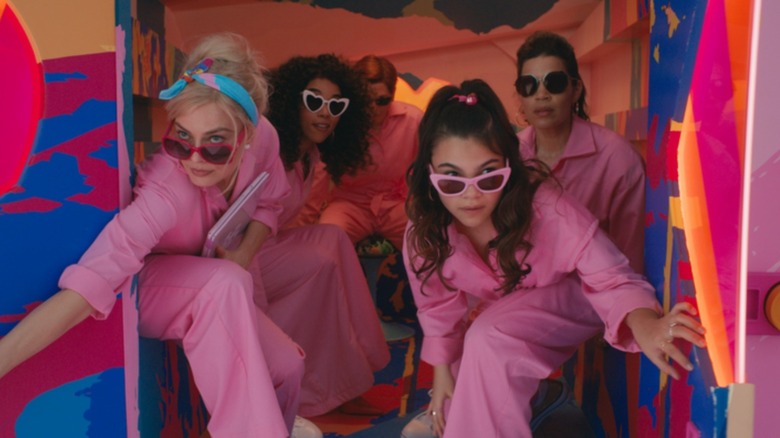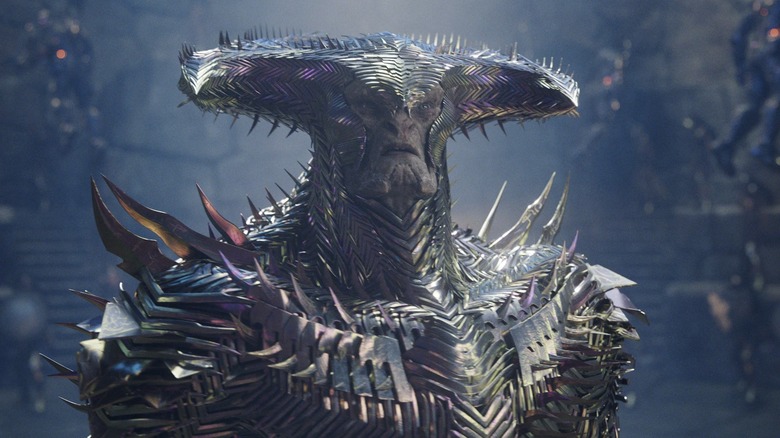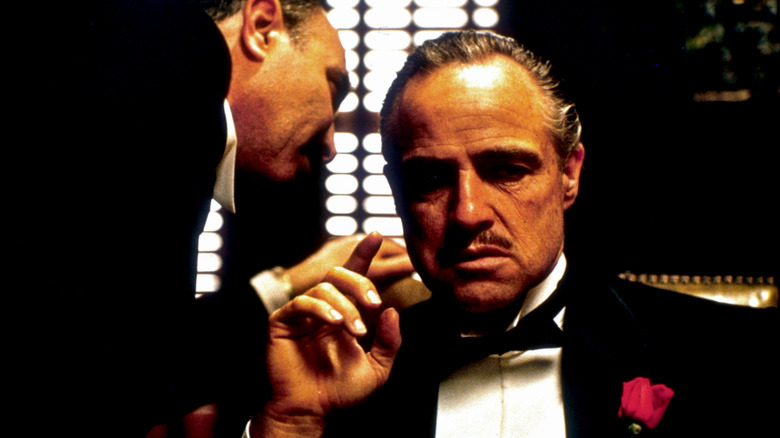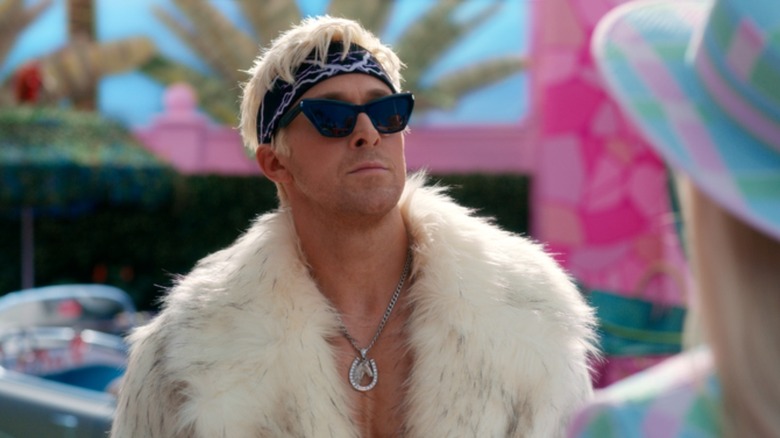Greta Gerwig's Barbie Has No Time For Obnoxious Film Bros (And Zack Snyder Fans)
This piece was written during the 2023 WGA and SAG-AFTRA strikes. Without the labor of the writers and actors currently on strike, the movie being discussed here wouldn't exist. This article also contains spoilers for "Barbie."
Greta Gerwig's new film "Barbie," based on the (in)famous Mattel-brand doll, begins in Barbieland, a pink, plastic, artificial world where all the women are Barbie and they're all inspiring. The president is Barbie, the Supreme Court is nine Barbies, Barbies run the businesses, and the most recent winner of the Nobel Prize in literature was Barbie. There are Kens in Barbieland as well, but they only exist to vie for the various Barbies' attention. Ken (Ryan Gosling) longs for Barbie (Margot Robbie).
When Stereotypical Barbie has an existential crisis — in her innocent, artificial world, she thinks about death for the first time — the doll treks into the real world to find the little girl who is piloting her from afar (she is, after all, a toy). In the real world, Barbie is shocked to find that women do not rule the world and that many people hate Barbie and everything the toy represents. Gerwig, who co-wrote the screenplay with her partner Noah Baumbach, includes several talking points about how Barbie, her figure, and her love for conspicuous consumption is blamed for setting back feminism by decades.
While Barbie faces the darkness, Ken — a bit of a dim bulb — finds that men control a great deal of everything. Armed with the forbidden fruit of the patriarchy, Ken returns to Barbieland and begins spreading the gospel of toxic masculinity. He just wants to be in charge. The Barbies, ill-equipped to face maleness and intrigued by this new notion of "the patriarchy" instantly become submissive airheads who serve Kens drinks and rub their feet.
The Nobel-winning Barbie (Alexandra Shipp) even admits that the toxically masculine Kens insisted watch and praise a certain movie: the Zack Snyder cut of "Justice League."
Yippie-ki-yay, Motherboxer
Shipp's line comes at a time in the movie when the main Barbie has returned to Barbieland and discovered the damage Ken's toxic masculinity has done to the world. Barbie's Dream House was stolen and transformed into Ken's Mojo Dojo Casa House. He has taken to wearing furs, working out, watching movies about horses, praising "The Godfather," and playing "Mortal Kombat." Things are broken and dirty. Women are subservient. The world is now male. It's up to Barbie to separate the other Barbies from the Kens and "deprogram" them.
The Shipp Barbie, once deprogrammed, admits that, while under the influence of men, felt like she had a genuine stake in the Zack Snyder version of "Justice League."
One might recall the kerfuffle and widespread Twitter dot com hashtag campaign surrounding "Justice League," the superhero film from 2017. During production, the film's director, Zack Snyder, was already having trouble making the extra-long movie he wanted, and many rewrites and reshoots were being done on the fly. When Snyder experienced a personal tragedy, he left the film, and Joss Whedon took over as its (uncredited) director. The film was shortened and altered into a reasonably entertaining if not somewhat shabby and shallow film. A small but vocal contingent of bafflingly hateful nerds began to emerge from the trenches of 4Chan demanding that Warner Bros. restore Zack Snyder's film to its original length, convinced that an extended cut already existed somewhere. #ReleaseTheSnyderCut became an aggressive rallying cry on social media.
In 2021, Warner Bros. capitulated. The company spent an additional $70 million to shoot additional scenes, and a four-hour cut of "Justice League" was released on HBO Max. The bullies got their way.
The irony was: the four-hour cut is no more or less entertaining than the two-hour theatrical version.
The Godfather
Pestering a studio for an extended cut of "Justice League" is perhaps the ur-example of foul film-bro behavior in the age of social media. Film fans, wielding newfound access to social media (in the broad scheme of cinema history) used it to badger people and bully filmmakers. "Justice League" was the line in the sand for Snyderbros. This is where artistic integrity needs to be defended.
Keep in mind that this is for a film with Aquaman in it. The Justice League characters weren't complex avatars of the human condition. They were cape-wearing fight machines. Zack Snyder, however, captured a certain flavor of overwrought adolescent angst with his superhero movies and a cadre of young men gathered around him. Once the long version of "Justice League" was released, #ReleaseTheSnyderCut was finally acknowledged as a red flag. Anyone who used it was an obnoxious film bro of the highest order.
Gerwig knew all this, and inserted a "Justice League" reference into "Barbie," knowing that the audience kind of understood the code as well.
Another way the Barbies placate the Kens is to — even though they weren't really interested — ask them to describe the brilliance of Francis Ford Coppola's 1972 film "The Godfather" to them. Whether or not one likes "The Godfather," one might agree that it has a certain contingent of annoying, ultra-male fanboys who intellectually get off describing it. The film takes place in a male world of violent mob power, and it seems that some audiences see it as an aspirational power fantasy and not a tragedy.
Hands up if some dude — and it's always a dude — tried to impress you with a conversation about "The Godfather." Or maybe "Scarface." Or "Fight Club." Or "A Clockwork Orange."
Attack of the Bloviating Film Bros
In Barbieland, and for Gerwig, no one has patience for film bros bloviating pseudo-intellectually about ultra-male power fantasies. One of the Barbies asks one of the Kens to tell her about "The Godfather," feigning ignorance. "I just don't get it," she says. The Ken is all too happy to sit her down and explain just why "The Godfather" is a work of art. Gerwig is tapping into a vein of cerebral arrogance possessed by many film bros. There are certain immutable truths, the film bro code goes, that cannot be denied. The greatness of "The Godfather" is at the top. Violent fantasies about terrible men are the pinnacle of the cinematic arts. Gentle comedies, romances, films about women, films about pacifism, none of these are allowed in the film bro canon. What films are in the film bro canon? Have you seen the IMDb top 250?
Greta Gerwig sees the self-serious habits of film bros and playfully dismisses them as an obnoxious habit that all too many men have. I would be curious to know if she ever had a date wherein a young man tried to wow her with his analysis of "The Good, the Bad, and the Ugly."
Not that any of these films are bad, but they are emblematic of a certain type of cinema fandom. And it's a kind of fandom that is not welcome in Barbieland. Barbie has no patience for film bros, and perhaps neither does Gerwig. Indeed, does anyone?



